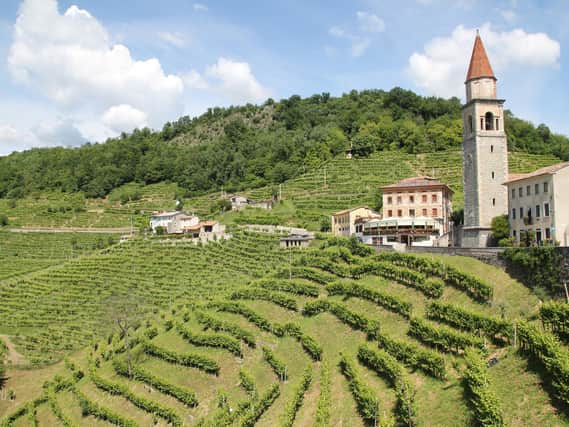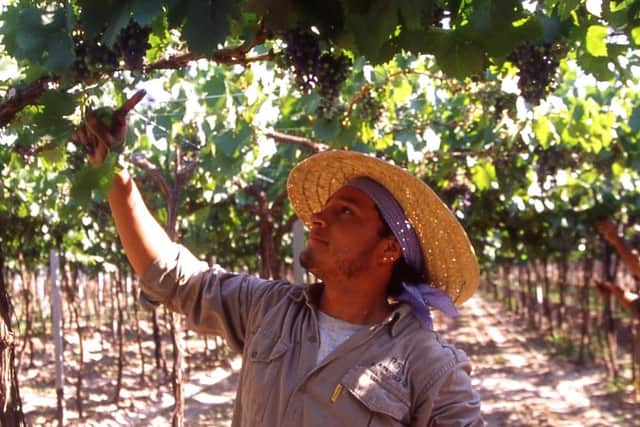Why vegan wine is a trend worth exploring this year


After all the usual feasting and drinking over the festive season, everyone’s liver needs a rest.
But this year? Probably not. Christmas was pretty much cancelled across the UK and, for me, the strangest thing was delivering food to my family who had expected to join us for several days but then had to cancel.
Advertisement
Hide AdAdvertisement
Hide AdWith no food in their fridge and twice as much as I needed in mine, we wrapped up a care package of half a turkey, stuffing, vegetables and a big chunk of Christmas cake and delivered it in a socially distant manner.


So having survived the strangest festive season, why would anyone then impose another restriction on their lives and cut out alcohol for the whole of January? A glass of wine while making Zoom calls to friends and family is all that is keeping us engaged with the rest of the world.
But there is still the need to explore other ways of living, and apart from the huge boom in home-based exercise equipment, to replace the usual January gym membership, there is another definite trend – going vegan.
Vegans do not consume any animal-related foods, so that cuts out eggs, milk and gelatine and these are the products that impinge on the wine industry.
Advertisement
Hide AdAdvertisement
Hide AdBut why should any wine contain animal products? Grapes are fruit and wine is made from fruit. Surely all wine is vegan?
Not exactly. The process of making wine from grapes is very simple. Crush the grapes, ferment them with yeast (which is vegan) and bottle the product. This process is absolutely fine so long as you like cloudy wine. Grapes are more than just sugar and water.
They have proteins, pectin, antioxidants, tannins and colouring matter and these don’t just disappear at the end of fermentation. Sometimes they hang around in the wine in a haze which doesn’t do you any harm but it means that the wine you buy won’t look clean and bright in the bottle. They may also settle into a sludge at the bottom of the bottle when you store it at home.
To clear that haze and make the wine bright so it looks appetising in your glass you need to clarify it. This can be done in several ways but the oldest methods, still in use at some wine producers, involve egg whites, casein (from milk), isinglass (from fish) or gelatine.
Advertisement
Hide AdAdvertisement
Hide AdThese sink through the wine, collecting up all the hazy stuff. If you have ever needed to clarify a batch of consommé – if anyone makes consommé these days – you will probably use an egg white in the same way.
But there are modern replacements for these products and so bentonite, a fine powdery clay from Wyoming, has now replaced animal products in many wineries and there are other vegetable protein replacements that do the same job.
One of the easiest ways to clarify your wine is to let it clear over winter. For inexpensive wine, this really isn’t an option since new vintage wines have to keep moving to get to market. So vegan wines are clarified using non-animal products and they usually declare their credentials on the back label with a V signature.
All wine producers are keen to show off their wines that are made to vegan standards. I have tasted dozens of these and here is my top ten selection.
Whites
Advertisement
Hide AdAdvertisement
Hide AdFinest Falanghina del Sannio 2019, Campania, Italy, Tesco, £9: From one of the best producers in the region, this has herb-dusted fresh apple and pear fruit, with all the right flavours to partner asparagus risotto.
Yalumba Organic Sauvignon Blanc 2019, South Australia, Co-op, down from £10 to £8 until February 2: A delicious Sauvignon that manages a touch more sunshine and tropical fruit than most. Dry with passion fruit and mango notes, this goes well with crunchy salads.
Rigal Vin Orange 2019, France, Morrisons, £10: Orange wine is not made from oranges; the “orange” describes its low intervention, no-additives method of winemaking. Made from Gros Manseng grapes macerated for six weeks, the flavours are soft and savoury with a layer of ginger spice. This wine was such a success it sold out quickly but the new vintage should be making its way into stores soon.
Bonterra Estate Collection Chardonnay 2019, Mendocino County, California, Waitrose, £12.99: From an estate that went organic long before it was fashionable, this has rounded, ripe, melon, lemon and pineapple fruit with a touch of savoury oak on the finish. Perfect with butternut squash recipes.
Sparkling
Advertisement
Hide AdAdvertisement
Hide AdCollezione Oro Vegan Prosecco, Italy, Aldi, £6.99: A new addition to the Aldi range, full of crisp, pear and apple fruit with floral notes and a creamy, gentle fizz.
Reds
Ch. Capendu La Comelle 2018, Corbières, Waitrose, £6.99: Proof that vegan wines are not expensive. Jean-Claude Mas makes wine across the south of France, bringing out the character of each region. This blend of Carignan and Grenache packs black fruits, a touch of vanilla and a stylish, long finish. Match with a veggie casserole.
Davida 2019, Navarra, Co-op, down from £8 to £7 until February 2: Almost half the Co-op range is now made to vegan standards. This also has no added sulphites, although winemaking does actually create a small amount during fermentation. Full of soft summer-berry fruit.
The Best Côtes du Rhône Villages 2019, Morrisons, £8.25: A stylish mix of Grenache, Syrah and Mourvèdre, this has layers of pepper-dashed blackberry fruit and enough backbone to stand up to a spicy chilli non-carne.
Advertisement
Hide AdAdvertisement
Hide AdViñalba Malbec Bonarda 2018, Argentina, Majestic, £8.99 on a mix six deal: Finding vegan wines in a meat-eating country like Argentina shows just how important the trend to veganism is. Enjoy the dark mulberry fruit, lifted with cherry fruit from the Bonarda grape.
Mad Fish Shiraz 2018, Western Australia, Tesco, £9: Seriously good Shiraz with loads of pepper and dark fruit.
Comment Guidelines
National World encourages reader discussion on our stories. User feedback, insights and back-and-forth exchanges add a rich layer of context to reporting. Please review our Community Guidelines before commenting.